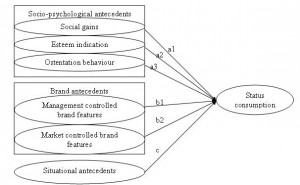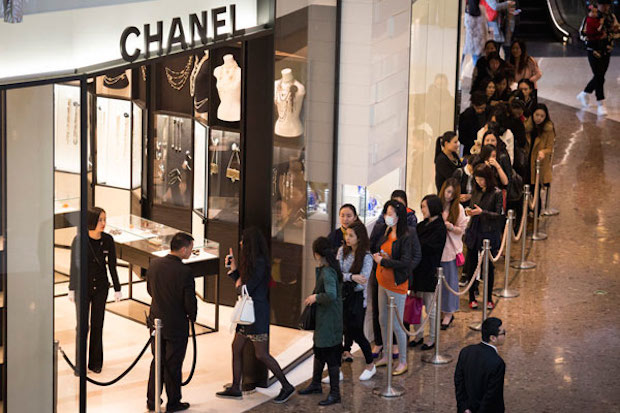Recently one of my research papers got published in the ‘International Marketing Review’. It focused on comparing the status consumption tendencies of British and Indian consumers. In this post, I shall focus on the findings of this study.
Firstly, let me define what status consumption is and how it affects our behaviour? Researchers define status consumption as the consumers’ behaviour of seeking to purchase goods and services for the status they confer, regardless of consumer’s objective income or social class. Status consumption generally involved high-end expensive luxury products. They are not consumed by most people regularly but only at the social events of importance. Many consumers use such products to satisfy material needs but also the social needs. In simple words, using status consumption many consumers try to impress the significant others who may include their superiors, social connections, or possibly a future spouse. Status consumption is suggested to be increasing the brand value of the consumer too.
While the importance of status consumption is known historically world-over, earlier studies in the domain of status consumption have looked at a single nation and industry context with regard to status consumption. For example, earlier studies have looked at status consumption from the context of clothing in Australia, woman’s cosmetics in the US, automobiles in the US and the UK. However, status consumption does not have such national boundaries and is found to be prevalent across the globe.
Therefore, to observe the similarities and differences relating to status consumption, I conducted a study focusing on the status consumption practices among the British and Indian consumers. The countries were chosen for their historic association, product category association with status consumption and commonalities of brands available. For example, India was a British colony for a long time (more than 3 centuries) and Indians are one the largest ethnic minorities in the present day Britain. Similarly, India happens to have the second largest English speaking population across the world. While both countries share great economic and cultural ties, they are significantly different from each other on many macro and micro parameters.
The study focused on three important antecedents of status consumption: (a) socio-psychological antecedents; (b) brand antecedents and (c) situational antecedents. The socio-psychological antecedents were further broken into three different categories namely: (a1) social gains; (a2) esteem indication and (a3) ostentation. The brand antecedents were also broken into two categories namely: (b1) management controlled brand features and (b2) market controlled brand features. The figure below represents the model.
Instead of discussing the methodology and scale equivalence and such other statistical issues, I will now focus on the status consumption tendencies among the British and Indian consumers. If you wish to read more about it, you can surely visit the source provided below or get in touch with me for further details.
It was observed that British consumers utilized status consumption to achieve social gains, indicate esteem and ostentation behaviour. However, in the Indian context consumers engaged in status consumption with mostly ostentation in mind. This demonstrates the differences between Western and Eastern consumers and the impact of culture and markets in their consumption practices. The British consumers, who belong to individualistic culture, focus on their actual self-concept (how the consumer views him/herself). However, in comparison with the Indian consumers, from a collectivist culture, focus on others self-concept (how a consumer thinks others see him/her) as they wish to signal ostentatious behaviour via status consumption.
With regard to Brand antecedents, it was observed that both, management controlled and market controlled brand features have a significant impact on status consumption. However, British consumers were significantly affected by brand antecedents than the Indian consumers. This can be attributed to the nature of the market and competition. The UK is a highly developed and mature luxury market wherein the masses have been exposed to the status (luxury) goods for longer in comparison to India which opened its economy in the late 1980s. The longer exposure and higher availability to global brands as well as the higher competition makes the consumer in the UK increasingly aware of the brands and their symbolic association. Impact of these contextual factors make the British consumers use strong brand cues in building social presence.
The findings also suggest that status consumption among Indian consumers is highly dependent on occasions. The result demonstrates the significant differences among collectivist and individualistic consumers and their status consumption practices. Prior research has highlighted that spending money on status consumption in festivities and occasions of importance brings many tangible and intangible rewards in the Indian market include elevated social status for the consumers. However, no such social advantages of occasions exist in the British marketplace. Therefore, in a collectivist society like India, consuming ostentatious products at special occasions can elevate an individual’s intra-group and inter-group social identity and overall presence.
In the next post, I shall focus on the managerial implications of the study findings.
Source: Shukla, Paurav (2010), “Status Consumption in Cross-national Context: Socio-psychological, Brand and Situational Antecedents”, International Marketing Review, 27 (1), forthcoming.


![Reblog this post [with Zemanta]](http://img.zemanta.com/reblog_e.png?x-id=b602239c-aa91-4fd9-9cae-2e622d80bd10)





